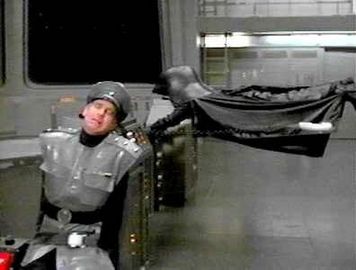
How many a-holes do we have on this ship?
I received this email from my college roommate today:
listening to public radio this morning they kept talking about a decline in the amount of new homes being built as a bad sign. isn’t this going to happen eventually anyway since the amount of open land gets smaller with every house?
I didn’t hear it myself. I’m wondering if this was national public radio, or a local DC show, so that I can look up who the interviewer/interviewees were. That always has to be the first question to ask yourself, “what is this guy’s angle?” Without knowing that I can’t pinpoint why he might be saying that lack of new housing starts is bad, because…well, what is bad?
Is it bad because he is in the real estate industry and knows no other way to operate his business than the status quo that has utterly failed and bankrupted us? Is it because he’s an economist and worried about losing jobs in the housing construction industry? Was it bad that the horse and buggy industry is no longer a thriving job growth industry?
Cars have their place. Single family housing has its place. This is the common misconception of me, typically by those who don’t know any better or are so mired in ideology or fear of altering their precious status quo. That I excoriate them because of my own preferences. First, that wouldn’t be very professional. Second, and personally, I live by a simple rule: Live the way you want, as long as it doesn’t negatively affect others and ensure that others have a similar choice to be able to live they way that they want without negatively affecting others.
Want to stop bailing out banks for bad loans on single family houses people couldn’t afford? Want to stop wasting money on overextended infrastructure and unnecessary and poorly planned highways? WALKABILITY IS A TAX CUT.
Unfortunately, we built a structural inertia upon zoning, bank loans, tax incentives, and road construction that carried us WAYYYY past equilibrium for those industries. We are now experiencing the pain of this overshoot, like any druggie experiencing withdrawal. Any institutions we establish have to be flexible and adaptable enough to change when we change and learn as we learn, or else it becomes a starship in ludicrous speed with no breaks.
It is the cause of every recession. The severity of which is determined by how far we went off in one direction and how long it takes until we reverse the inertia. I’ve been howling about the impending housing doom since 2002, but that apparently was steering the Titanic with flippers and scuba gear whilst hanging onto the rudder. I was just too naive and broke having just graduated from school to know how to wager against it.
So no more housing starts may or may not be a bad thing, but we have to look deeper. Where are those housing starts occurring or not occurring? If they are no longer occurring at the edge, in exurbia, that is a good thing. We can’t afford more single family homes at the edge nor the infrastructure to them. All the people who CAN afford to be out there, either already are or they choose not to be.
We KNOW we have at least a surplus of 4 million large lot single family homes. We’re pretty sure that banks are sitting on x2 that number to inflate the prices on the previous 4 million. With the ARM resets about to happen this year and next, we might be looking at another x2. Some estimates have a surplus of 22 million by 2025.
Building new houses is insane, at least in the way we’ve been doing it, on land in exurbia that the highest and best use of is probably agricultural production or nature. The housing industry keeps trying to prop up the myth that everybody needs their single family house in BFE, as some sort of sign of independence or surge in middle class choice or prosperity. All marketing BS. They do so, because it is easy on them. Land is cheap, so they externalize transportation costs on the consumer.
Cities, particularly young cities that know no better are eager for the tax base. That is, until they get the bill to maintain that infrastructure at such a low density. But the unfortunate reality is that you can’t unbundle transpo from housing without having a lot of poor people stuck in the middle of nowhere.
If it is because there is no new housing where we badly need it, where it is tied to cheap, effective, optional choice of transportation then it is a bad thing. And we need to loosen up the credit markets for locational efficient housing starts for rental, ownership, and affordable housing. This should be job one at the federal and state level.
The other key is utter and complete overhaul of all state and federal standards for transportation planning and design, land use and zoning, and affordable housing standards. Some of these are already happening. As I have said before, with all of the press that healthcare and bank bailout get, the best thing that any administration has done in thirty years is the effective merger of HUD, EPA, and DOT under one roof, with the exact right person in charge.
This will be the way out of this uber-recession. We just have to make sure we don’t cement this particular direction so we can provide some steering or breaking at a later date. Railroads were once as corrupt if not more so than the highway industry is now. It is the nature of the beast.





